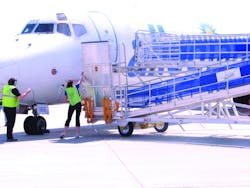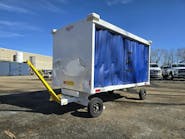The Trego/Dugan family of companies, headquartered in North Platte, Nebraska, has been in business for 46 years and specializes in aviation services including jet management, private jet charter, aircraft acquisition, jet and turboprop maintenance, avionics, and FBO Services.
A family-owned and managed aviation services company that provides more than 100 jobs in five states, Trego/Dugan has shored up a new service offering in recent years - airline ground handling. As of June, the company will handle 17 flights per week for Allegiant in four cities (Grand Island, NE; Pueblo, CO; Minot, ND; and Bismark, ND), and 14 flights per week for American Eagle in Grand Island.
CommentsTrego/Dugan Aviation of Grand Island Inc. president, Vincent Dugan, "For smaller cities that have less than daily commercial service, you must have a turn key solution for the airline with respect to ground handling.
"The airline is not going to want to put their own employees there because it's not cost effective. The airline then has three choices: do it themselves; get the local FBO to do it; or the city can reach out to a third-party service provider like Trego/Dugan to do ground handling, which can be done profitably."
A fractured industry
Nicknamed the 'FBO of the Plains', Trego/Dugan began as a traditional FBO at the North Platte Regional Airport. A mid-continent refueling stop, the FBO has an additional location at the Central Nebraska Regional Airport in Grand Island, and a jet management division located at the Chicago Executive Airport some 18 miles northwest of Chicago.
Says Dugan, "Flexibility in management is important; you don't want to be doing things you don’t make money at. We are willing to adjust in an ever-changing business. We are vertically integrated by doing a variety of different things, and the areas we found to be profitable are jet charters, aircraft maintenance, and fuel sales. Now we add to that mix airline ground handling.
"The FBO industry is a fractured one with many legacy FBOs specializing in one service. FBOs that have been doing this for 40 or 50 years - some people don’t adjust to change well. I don’t feel the shackles of having to do only one thing; ground handling may not be as sexy as flying a Learjet 45 for celebrities, but its down and dirty and it pays bills - it has our attention."
Airlines need quality ground handlers, and for a lot of cities a company like Trego/Dugan can be the answer, he adds. Dugan relates that smaller markets are right for low-cost carriers, and Trego/Dugan is prepared to expand its ground handling services to any of these markets.
"If an FBO is uncooperative on fuel cost or deicing or ground handling, I tell the airport there is no aspect of handling this aircraft that I cannot do," remarks Dugan. "So if you can figure out how I can do it with respect to your minimum standards, I can do fuel too. I can de-ice. If I have the access I can do every aspect of it; this is why we are particularly well suited to do this. We are not afraid to do any aspect of it."
Labor; equipment
Dugan says the company has some 35 mostly part-time employees dedicated to airline ground handling. "The key is having a strong station leader; we control our ground handling operations from North Platte. We have people who a lot of what they do is make sure we stay organized with billing, and control of the main cost item, which is labor," he relates.
Alligiant offers flight benefits for Trego/Dugan's ground handling employees, many who are students. The ground handling work isn't a fit for traditional employees due to the nature of the work schedule, says Dugan.
With regard to ground support equipment, some is purchased and some is provided by the airline. "You have to be ready to adjust," explains Dugan. "Sometimes the airline wants to own it, in some locations we own the equip, and in some locations the city even owns it."
On GSE maintenance, says Dugan, "Airline ground handling is an important part of our future and we cross-train people that work in other areas. A flight instructor can also be trained in ground handling for extra money and flight benefits.
"Generally we take care of our own equipment; people are not hired to be inside or outside, we hire to cross train."
Moving ahead
In Grand Island airline ground handling adds more than 500,000 gallons in fuel a year, but with airline fuel, the company doesn't charge anywhere near the margin it does on private jets, relates Dugan. "Its an everyday thing, you’ve got to be cooperative with the airline and you’ve got to make it so the airline wants to buy fuel," he adds.
"We do this on a per-turn basis; I don’t charge them any margin. They pay for the fuel, they pay me to pull the truck up and pump the fuel, and what I charge for that varies on the size of the airplane.
"I always looked at this as: I have to go to the airline to get more of this business. But I’ve now realized that the cities are who I should be talking to. It’s the cities that have the vested interest in this airline service, and we have a solution. We will do it, we want to do it, and we like to do it."





